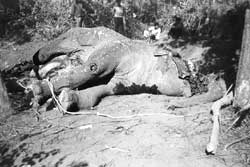Corbett killings: Arunachal link?
 Could the Nishu tribe from the Namdhapa region of Arunachal Pradesh provide a lead to the forest department (fd) officials investigating the poaching of two male tuskers in the Rajaji National Park on December 6, 2001? While the modus operandi of the killing has not been ascertained as yet, the poisoned arrows used earlier to kill six elephants in Corbett National Park have been traced back to the Nishu tribe from the Namdhapa region of Arunachal Pradesh.
Could the Nishu tribe from the Namdhapa region of Arunachal Pradesh provide a lead to the forest department (fd) officials investigating the poaching of two male tuskers in the Rajaji National Park on December 6, 2001? While the modus operandi of the killing has not been ascertained as yet, the poisoned arrows used earlier to kill six elephants in Corbett National Park have been traced back to the Nishu tribe from the Namdhapa region of Arunachal Pradesh.
The park's deputy director, Sameer Sinha, says, "The elephants were killed not by guns but with arrows, which were laced with poison. The poison-laden thread strung around the arrows used to kill the elephants is typical of the Nishu tribe.' Sinha headed the team that had been sent to Arunachal Pradesh to investigate the link. A S Negi, chief wildlife warden of Uttaranchal, says, "Whether a Nishu was personally involved or not remains a matter of investigation.' On the recent killings in Rajaji he says, 'While we have not yet been able to detect the method of poisoning of the two Rajaji tuskers, the use of poisons similar to that used in Corbett cannot be ruled out. The veterinary doctors checking the dead elephants could not identify the poison used due to a delay in the tests.'
Vivek Menon of Wildlife Trust of India, a Delhi-based non-governmental organisation, says, "The cases of poisoning in Uttaranchal point to two clear trends in poaching: the poachers are now taking recourse to the more traditional methods. And, north India, which was relatively free from the menace of poaching till recently, is being increasingly targeted as it has one of the best male to female ratios in the country.'
Sources within the Union ministry of environment and forests claim that the Union home ministry is looking into the role of the Nishu tribe, which lives on the India-Burma border.
Meanwhile, the Uttaranchal fd has deployed four platoons of the Provincial Armed Constabulary (PAC) as well as forest guards and rangers at Rajaji. Sources say that the role of the PAC is limited to the periphery of the park.
The investigators are said to have cracked the whip on Van Gujjars, who have been residents of the Shivalik forests for centuries. They have been asked to either divulge information about poaching in the area, or face action. One Gujjar youth has been arrested in connection with the poaching. The police have also reportedly detained several members of the tribe.
The Gujjars allege that the police are slapping false charges against them. Several youths from the tribe have been detained and tortured, they say. Avdhash Kaushal, head of NGO Rural Litigation and Entitlement Kendra, has also reportedly complained that the Gujjars are being framed and victimised.
